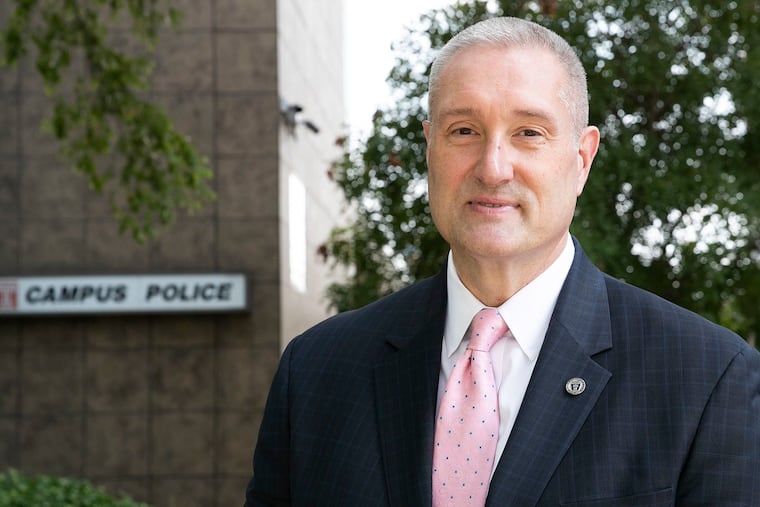Temple police chief resigns amid surge of violence in the campus neighborhood
Charles Leone will step down effective April 29. He said it was “100% my decision” and that he had been talking with his wife for a while about making a change.

Temple University’s public safety executive and police chief, who has been at the school for more than 36 years, has resigned amid a surge of violence in the campus’ North Philadelphia neighborhood.
Charles Leone, executive director of public safety, said he will step down effective April 29. In an interview Thursday evening, shortly after the university announced the change, he said it was “100% my decision” and that he had been talking with his wife for a while about making a change.
“It’s unfortunate, but I get it,” said Ken Kaiser, Temple’s senior vice president and chief operating officer, who also asserted that it was Leone’s decision. “Charlie’s worn out. He takes his job very seriously, and it’s wearing on his heart so to speak.
“It has been a really difficult three years with the pandemic and all the incidents on campus. He’s ready to hand the reins to somebody else and give somebody else a shot and let us reshape what’s going on.”
Leone, 59, started in the department as a security guard and worked his way up to the top post, which he has held for eight years.
Deputy director Denise Wilhelm, also a member of the department for more than 30 years, is stepping in as interim chief. The university plans to launch a national search and hire a consultant to help, Kaiser said.
“It will give us an opportunity to take an even deeper look into the department and see where things can be changed for the better and what we’re doing really well and replicate that in other areas of the department,” Kaiser said.
» READ MORE: As near-campus shootings continue, Temple announces new steps to make students feel safer
The move comes a day after the university announced new measures to try to improve safety, including offering nearby landlords with student tenants up to $2,500 grants to install lighting and cameras on their properties. It also is opening up on-campus residences to any off-campus students who want to move in for the rest of the semester.
The new measures followed two more shootings that occurred on and near the campus last Friday night, increasing angst among parents and students. In one, two teenage girls in a car were shot during an altercation at the corner of North Broad and Cecil B. Moore, which is on campus. The other shooting was at a house at 1826 W. Diamond St., which is outside the university police patrol zone. Both Temple students and nonstudents attended the party there, but Temple students were not involved in the shooting, Leone had said on Wednesday. At the party, a fight started and a male was kicked out, Leone said. He came back inside shooting, and the security hired for the party fired back, he said. Two people were shot.
The campus has been on edge since November when student Samuel Collington was shot to death in the middle of the day during a carjacking as he returned to his off-campus residence after Thanksgiving. His death followed the fatal shooting of 18-year-old Ahmir Jones, who was not a Temple student, within three blocks of the campus.
The university at that time promised to increase security, including establishing more city police patrols in nearby student residential areas and boosting the 115-officer campus police force by 50%. The school also said it would upgrade lighting, cameras, and emergency phones and increase the availability of shuttle service and its walking escort program. And in January, the university announced that it had hired former Philadelphia Police Commissioner Charles H. Ramsey to conduct a campus safety audit. That audit is to begin next month, the school said Wednesday.
The university said in addition to 10 new officers hired in January, several others are undergoing background checks and the department hopes to place 12 more in an upcoming police academy class. Even though the department has unfilled openings and has lost some officers, the university maintains that since Collington’s death, it has more than doubled the number of officers actively patrolling through the use of overtime and supplemental Philadelphia police, whom the university is paying to patrol the area around campus.
Alec Shaffer, president of the Temple University Police Association, disputed that the school has hired 10 new officers and asserted that the active number of patrol officers is 60.
Leone acknowledged the difficulty in finding enough officers and said the department is operating at about 75% or 80% staffing. The department, he said, had the same number of vacancies pre-pandemic.
“I think we’re doing a lot. I honestly do,” he said of the university’s efforts to combat the growing violence.
Shaffer in an emailed statement thanked Leone for his years of service.
“We look forward to forging a working relationship with university and police administration to improve safety in the community,” he said. “We also find it extremely important that Temple University include our association and its members’ input in the search for a new chief of police.”
Leone said he has other opportunities, but will take time to consider his next step.
Bradley A. Smutek, president of student government, said he was shocked and disappointed to hear Leone was leaving. Student government had just filmed a town hall with university leaders, including Leone, on Wednesday when questions on safety were raised, he said. That program is due to air next week. There was no hint then that Leone was leaving, he said.
Kaiser said Leone informed him about the resignation on Monday.
“He’s one of the best men I’ve ever met in my life,” Smutek said. “He has so much integrity. I never heard him make an excuse or blame somebody else.”